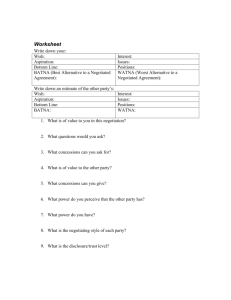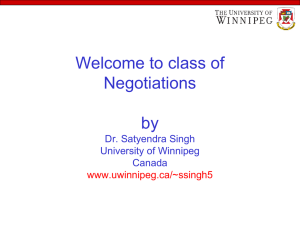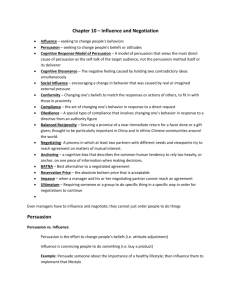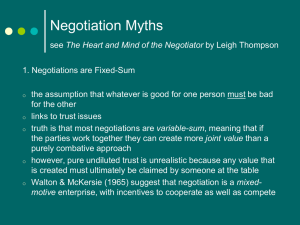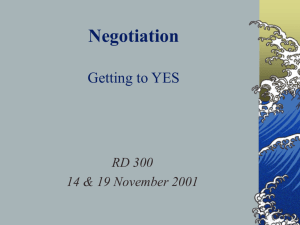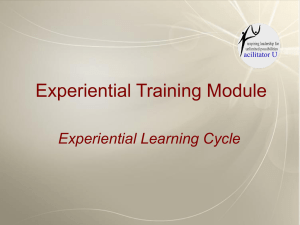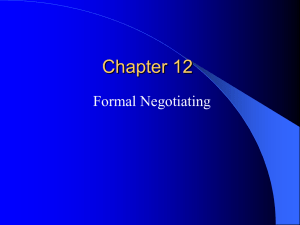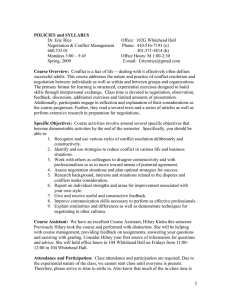Week 8: Power and Influence
advertisement
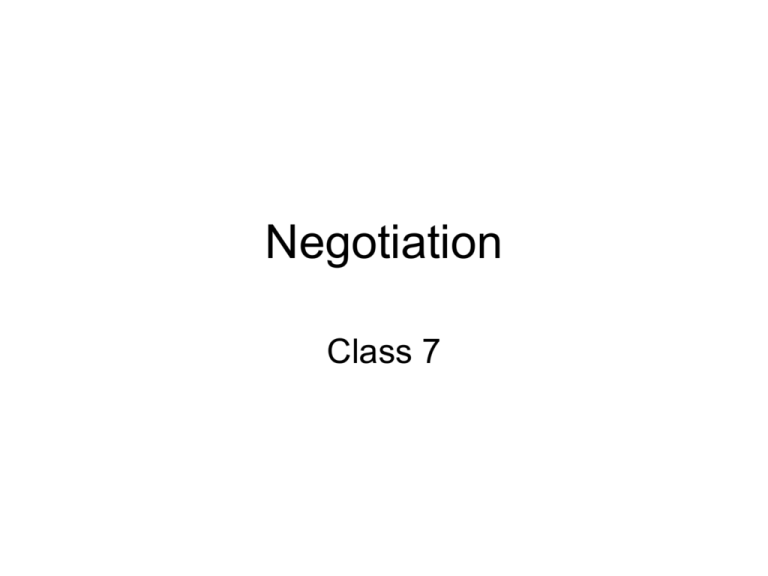
Negotiation Class 7 Questions about Negotiation • Do all negotiations have a winner and a loser? • Is the best strategy to be tough or soft? • Are the best negotiators born that way? • Do the best negotiators take risks? • Do the best negotiators rely on intuition? • Can you learn from your negotiation experiences? Negotiation exercise • Find a partner • Read your instructions and plan your strategy • Wait for my go-ahead to begin • Write down 1 copy of your agreement • Debrief each other Debrief • What was your “target point”? – What were you aiming to get? – How did you set this target? • What was your “reservation point”? – What was the worst arrangement that you would be willing to accept? – How did you decide on this? • Goal: – Divide up the “zone of possible agreements” Debrief • What was your “BATNA”? – Best Alternative To a Negotiated Agreement? – Strategy: • what can you do to improve this?? • Can you find out the other party’s BATNA? • Should you reveal your BATNA to the other party? Debrief • Who made the first offer? Why? – How did this affect the rest of your negotiations? – How specific was the first offer? Did you suggest a range of possibilities? • What were the counter-offers? Why? – Did you re-calibrate your target or reservation point? – What concessions did you make? Negotiation exercise (II) • Find a NEW partner (groups of 2) • Read your instructions and plan your strategy • Wait for my go-ahead to begin • Write down 1 copy of your agreement • Debrief each other Strategies that didn’t work • Did you try anything that backfired? What happened? • Did your partner try any strategies that failed? How did you respond? Strategies that may be problematic: • Determination to make the deal “win-win” • Determination to compromise – Equal concessions • • • • Focus on a long-term relationship Benevolent / cooperative behavior Taking your time / stalling Lying Usually useful strategies • Perspective-taking – Trying to figure out what the other party wants or needs • Asking questions – What are the other party’s priorities? • Answering questions (within reason) Usually useful strategies • Unbundle the issues • Offer “package deals” • Make multiple offers simultaneously – Get away from sequential bargaining – Make the different offers equally desirable (to you) – Make all the offers at the same time • Ask for concessions Negotiation exercise (III) • Find three other people that you have not negotiated with yet (form groups of 4) • Read your instructions and plan your strategy • Wait for my go-ahead to begin • Write down 1 copy of your agreement • Debrief each other Multi-party negotiations • What made this negotiation more challenging than the last two exercises? • Was there anything that worked to your advantage? • Were there any pitfalls? How did you handle them? Multi-party negotiations • Set your own priorities and goals – Do not let another party decide or argue on your behalf • Try to agree on a process in advance – Ok to rotate roles if necessary (e.g., time keeper, note taker) • Stay “at the table” • Strive for equal participation from all groups Multi-party negotiations • Try to agree on something early on – What are the issues? What is the process? • Try not to give in to the “equal shares” bias • Try not to be too agreeable / disagreeable • Avoid “sequential bargaining” – Don’t vote on one issue at a time • Argue from principle / fairness • Don’t reveal your BATNA to your “ally” TED Talks • What were the primary arguments in the first talk? What about the second one? • What did you agree with? • What did you disagree with? • What else should have been included? • What is your overall assessment or evaluation of the talks?


